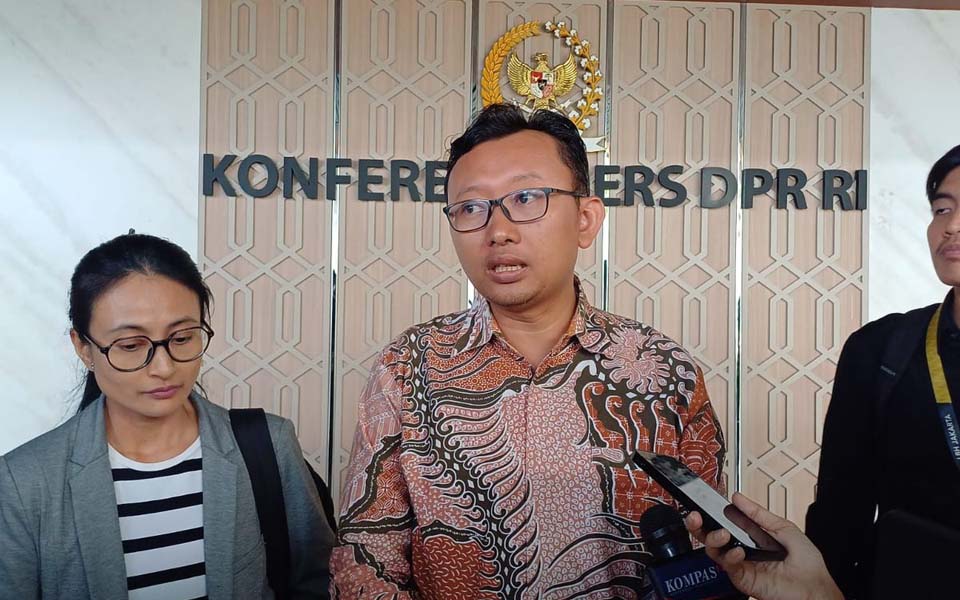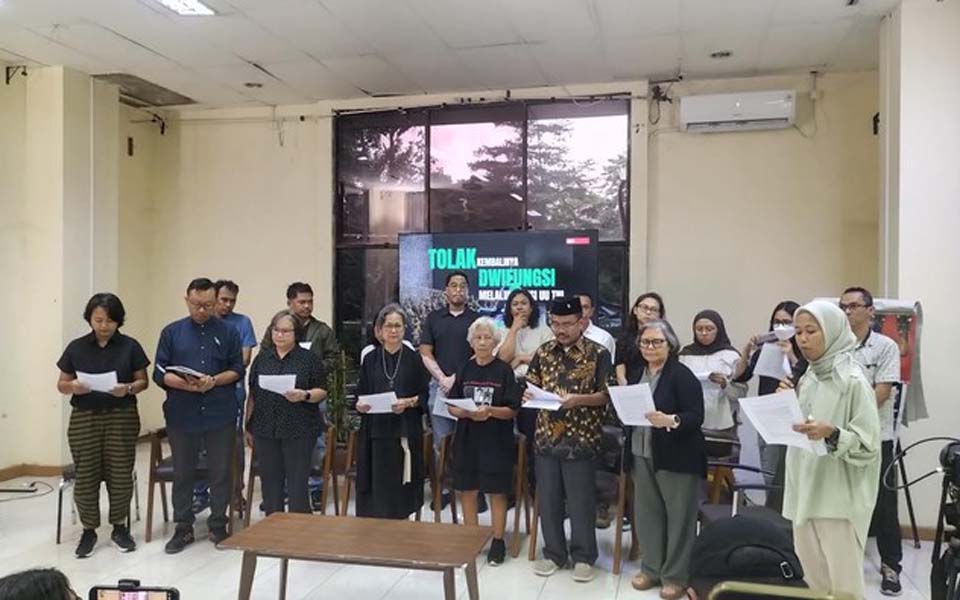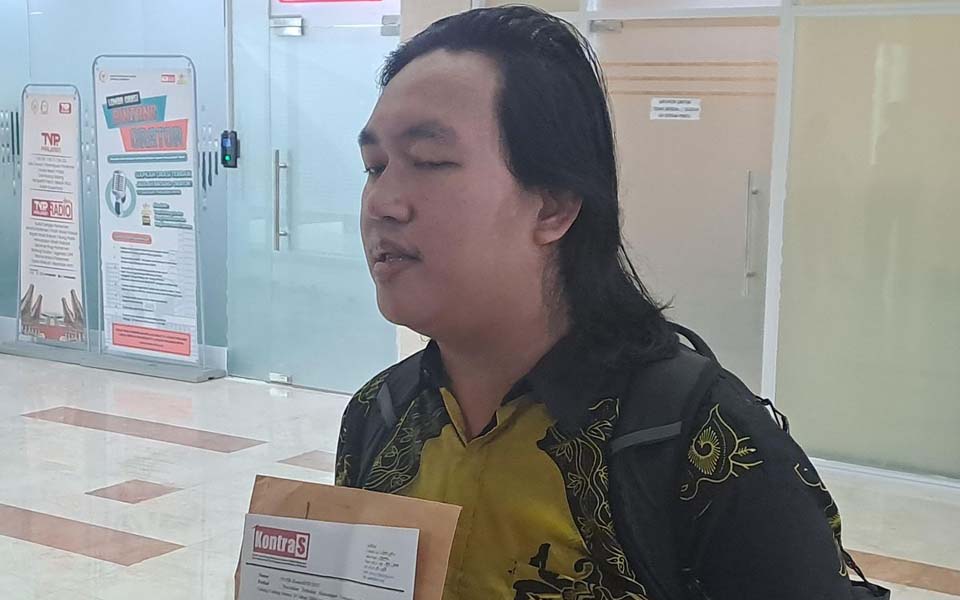Jakarta – Although it has received appreciation in accepting a formal test of a law for the first time in its history, the Constitutional Court (MK) has still been criticised over ruling Number 91/PUU-XVIII/2020 on a judicial review of Law Number 11/2020 on Job Creation (UU Ciptaker).
A number of parties are of the view that the court has sought a middle road or compromise which has in fact created confusion because the ruling is being interpreted differently.
Ambiguous ruling
Constitutional Law Professor Denny Indrayana believes the Constitutional Court tried to accommodate various interests and took a middle road which made the ruling ambiguous. The former Deputy Justice and Human Rights Minister said that the formal test of the Jobs Law by the court was to assesses the legality of the procedures by which it was made, not its contents.
The court, he said, initially appeared to take a clear position by declaring that the law conflicted with the 1945 Constitution (UUD 1945). But because of the "obesity" of existing regulations and overlapping laws (which the law was supposed to address), the court declared it conditionally unconstitutional.
And, in the end the court give the government and the House of Representatives (DPR) two years to revise the law. If within this time frame it is not revised, then the Jobs Law will become permanently unconstitutional.
"The court should not have been ambiguous, the MK [should have been] explicit in annulling the Jobs Law and if it wanted to provide room for improvements, this cannot be used as grounds for a law which was declared to have violated the constitution to remain in force", said Indrayana.
Political compromise
Speaking in the same vein as Indrayana, constitutional law expert Bivitri Susanti from the Jentera College of Law (STIH Jentera), said that the conditionally unconstitutional ruling and the two years to revise the law cannot be separated from political considerations. Susanti does not believe this is a victory for the applicants despite the formal test being granted.
"If we look at the MK's track record, we can also see how the MK always makes a political consideration, not just a legal one. It is because of this that the solution was [to declared the law] conditionally unconstitutional", said Susanti.
Padang Andalas University Faculty of Law Constitutional Studies Centre (Pusako) Director Feri Amsari also believes the conditionally unconstitutional ruling to be irregular.
He believes that that when the Constitutional Court ruled that the Jobs Law as formally flawed, then it should have explicitly declared that the law was annulled in its entirety. Meanwhile, according to Amsari, it is as if the court's ruling was a compromise which has confused both those to made the law as well as the general public.
"It was indeed rather irregular. Usually a formal problem means cancelling it in its entirety. Moreover the MK was not concerned about the issue of a legal vacuum with the MK itself declaring it would apply the previous regulations", said Amsari.
Up in the air
The Indonesian Legal Aid Foundation (YLBHI) along with its 17 regional offices believes that the ruling issued by the Constitutional Court is still up in the air. The reason being is that although it declared that the Jobs Law conflicted with the 1945 Constitution, the law a quo (as a lower law) remains in force for the next two years while it is revised.
"Four out of nine judges declared a dissenting opinion meaning they viewed the Jobs Law as being in accordance with the constitution. The MK's ruling seems to confirm that civil society's concern that the MK obeys the executive has been proven true", said YLBHI Advocacy Division Head Muhammad Isnur.
The Indonesian Forum for the Environment (Walhi) meanwhile urged to the government to immediately issue a corrective policy rather than focusing on revising the Omnibus Law so it is in accordance with the 1945 Constitution.
Walhi Executive Director Zenzi Suhadi said that the mandate they are referring to is the management of natural resources (SDA) aimed at generating the greatest possible prosperity and welfare for the ordinary people.
"We ask the government as quickly implement the mandate of the UUD 1945 especially in relation to the management of SDA for the greatest possible welfare of the ordinary people. The way to do this is adopting corrective policy measures", said Suhadi.
Migrant Care, a NGOs concerned with migrant worker issues, is asking the government to obey the Constitutional Court ruling.
Migrant Care Executive Director Wahyu Susilo said that they do not want the two years given to the government by the Constitutional Court to revise the law be used to maintain the status quo. He is calling on the government to immediately carry out revisions to the law.
Public participation
The National Human Rights Commission (Komnas HAM) meanwhile is asking that lawmakers involve the public in revising the law.
Komnas HAM Commissioner Choirul Anam explained that the government and the DPR should ensure public participation in the process of revising the Jobs Law in accordance with the Constitutional Court's ruling.
This participation, according to Anam, must be substantial and not come from just one group.
"The heart of what must be done (by the government) over the next two years is participation. Participation which is substantial", said Anam following an event titled "Performance Evaluation of Komnas HAM Complaints and Case Handling" on Friday November 26.
Anam explained that at the very least the government must use the plaintiff's notes on the Jobs Law in the revision process. Not instead inviting parties which agree with the government's proposals. According to Anam, the previous lawmaking process did not side with the interests of the people.
"Now, the ordinary people, who should be the beneficiaries of development feel that the design which exists within the Omnibus' (Jobs Law) policies don't side with their interests", he explained.
Anam added that the Constitutional Court's ruling that the Jobs Law be revised could give the government time to reflect on the interests that the law represents. The government must ensure that the policies it formulates do not harm the society.
"Not formulating [legislation] by themselves, while other people [the public] have to wait", he added.
Government to follow ruling
Coordinating Minister for the Economy Airlangga Hartarto meanwhile said that the government respects and will implement the Constitutional Court's ruling to the best of its ability. Including the order not to issue new strategic regulations until the Jobs Law has been revised.
"The government will follow up the MK's ruling by preparing revisions to the law and implementing as best as possible the MK's other directives as referred to in the MK's ruling", said Hartarto following the Constitutional Court's ruling on Thursday November 25. (ryn, cfd/kid)
[Translated by James Balowski. The original title of the article was "Ramai-ramai Kritik Putusan MK soal UU Ciptaker".]















